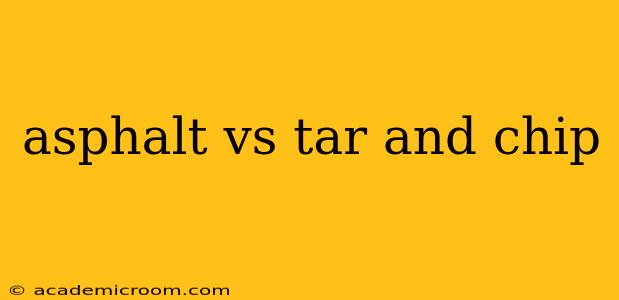Choosing the right paving material for your driveway, road, or parking lot is a crucial decision impacting both aesthetics and longevity. Two popular options often considered are asphalt and tar and chip. While both are used for paving, they differ significantly in their composition, application, and overall performance. This comprehensive guide will delve into the key distinctions between asphalt and tar and chip, helping you make an informed choice based on your specific needs and budget.
What is Asphalt?
Asphalt, also known as asphalt concrete, is a composite material consisting of aggregates (like crushed stone, sand, and gravel) bound together by bitumen, a sticky, black petroleum byproduct. The precise mix of aggregates and bitumen varies depending on the intended application and desired properties. Asphalt is known for its smooth, durable surface and relatively quick installation time. It's a common choice for driveways, roads, parking lots, and airport runways due to its strength and ability to withstand heavy traffic.
What is Tar and Chip?
Tar and chip, also known as chip seal, is a less expensive paving option than asphalt. It involves applying a layer of hot asphalt emulsion (similar to bitumen but often with added emulsifiers) to the existing surface, followed by an immediate application of small stones or "chips." These chips embed themselves in the emulsion, creating a textured, rugged surface. While less costly upfront, tar and chip requires more maintenance and has a shorter lifespan than asphalt.
Asphalt vs. Tar and Chip: Key Differences
| Feature | Asphalt | Tar and Chip |
|---|---|---|
| Cost | Higher initial cost | Lower initial cost |
| Durability | More durable, longer lifespan | Less durable, shorter lifespan |
| Surface | Smooth, even | Textured, rough |
| Maintenance | Lower maintenance requirements | Higher maintenance requirements |
| Appearance | Sleek, modern | Rustic, traditional |
| Application | Requires specialized equipment | Can be applied with simpler equipment |
| Water Resistance | Highly water-resistant | Moderately water-resistant |
| Traffic Bearing | Excellent | Good for light to moderate traffic |
What are the Advantages and Disadvantages of Each?
Asphalt Advantages:
- Durability: Lasts significantly longer than tar and chip.
- Smooth Surface: Provides a comfortable ride and is easier to maintain.
- Water Resistance: Effective in preventing water damage.
- Aesthetically Pleasing: Creates a clean, professional look.
Asphalt Disadvantages:
- Higher Cost: Significantly more expensive than tar and chip.
- Specialized Installation: Requires skilled labor and specialized equipment.
Tar and Chip Advantages:
- Low Cost: A budget-friendly paving option.
- Relatively Easy Installation: Less complex and costly installation process.
- Good for Low-Traffic Areas: Suitable for driveways with low traffic volume.
Tar and Chip Disadvantages:
- Short Lifespan: Requires more frequent repairs and replacement.
- Rough Surface: Can be uncomfortable to drive on and may damage vehicles over time.
- Requires Maintenance: Needs regular chip sealing to maintain its integrity.
- Less Water Resistant: More susceptible to water damage and potholes.
Which is Better for My Needs?
The best choice depends on several factors:
- Budget: If budget is a major concern, tar and chip is the more affordable option. However, the long-term cost might be higher due to frequent repairs and earlier replacement.
- Traffic Volume: Asphalt is ideal for high-traffic areas like roads and busy parking lots. Tar and chip is more suitable for low-traffic areas like residential driveways.
- Aesthetic Preferences: Asphalt provides a smooth, modern look, while tar and chip offers a more rustic appeal.
- Maintenance Budget: Asphalt requires less maintenance, while tar and chip necessitates regular resealing.
Ultimately, careful consideration of these factors will help determine whether asphalt or tar and chip is the best paving solution for your specific needs. Consulting with a paving contractor is highly recommended to receive personalized advice based on your project's unique circumstances.
How Long Does Asphalt Last?
The lifespan of asphalt depends on several factors, including climate, traffic volume, and the quality of the installation and materials. Generally, asphalt paving can last anywhere from 15 to 25 years, sometimes even longer with proper maintenance.
How Long Does Tar and Chip Last?
Tar and chip typically lasts 3-5 years before needing resealing, and its overall lifespan is considerably shorter than asphalt, often requiring complete replacement after 7-10 years.
Is Tar and Chip Waterproof?
Tar and chip provides moderate water resistance, but it's not completely waterproof. Over time, water can penetrate the surface, leading to damage and potholes, especially in areas with heavy rainfall or poor drainage.
Is Asphalt Better Than Tar and Chip?
Whether asphalt is "better" than tar and chip is subjective and depends entirely on individual needs and priorities. Asphalt offers superior durability and longevity, but it comes at a higher cost. Tar and chip is a cost-effective option but demands more frequent maintenance and has a significantly shorter lifespan.
